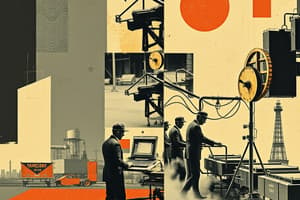Podcast
Questions and Answers
Productive labor focuses solely on the physical ability of an individual worker.
Productive labor focuses solely on the physical ability of an individual worker.
False (B)
Production methods include both empirical rules and subjective skills acquired through training.
Production methods include both empirical rules and subjective skills acquired through training.
True (A)
The final stage of the production process involves the manipulation of raw materials into intangible products.
The final stage of the production process involves the manipulation of raw materials into intangible products.
False (B)
Joining methods in manufacturing processes can include welding and riveting.
Joining methods in manufacturing processes can include welding and riveting.
Quality control and assurance do not consider industry standards and regulations.
Quality control and assurance do not consider industry standards and regulations.
Auxiliary materials are primarily used as raw materials in manufacturing processes.
Auxiliary materials are primarily used as raw materials in manufacturing processes.
Production means include both direct and indirect methods of transforming raw materials into products.
Production means include both direct and indirect methods of transforming raw materials into products.
The resources of production in manufacturing systems are limited to land, labor, and capital.
The resources of production in manufacturing systems are limited to land, labor, and capital.
Quality management focuses solely on the end product without considering the production process.
Quality management focuses solely on the end product without considering the production process.
3D printing is categorized as a traditional manufacturing process alongside machining and casting.
3D printing is categorized as a traditional manufacturing process alongside machining and casting.
Flashcards
Productive Labor
Productive Labor
Human ability, including physical, mental, and spiritual capabilities, used to carry out production activities.
Production Information
Production Information
Knowledge and expertise used to efficiently and economically implement manufacturing processes.
Material Selection
Material Selection
Choosing the right materials for a product based on its function and requirements.
Forming
Forming
Signup and view all the flashcards
Machining
Machining
Signup and view all the flashcards
Primary Materials - Production Objects
Primary Materials - Production Objects
Signup and view all the flashcards
Auxiliary Materials - Production Objects
Auxiliary Materials - Production Objects
Signup and view all the flashcards
Direct Production Means
Direct Production Means
Signup and view all the flashcards
Indirect Production Means
Indirect Production Means
Signup and view all the flashcards
Manufacturing Management
Manufacturing Management
Signup and view all the flashcards
Study Notes
Lecture 2: Fundamentals of Manufacturing
- Manufacturing encompasses understanding materials, processes, production systems, manufacturing management, and quality management.
- Materials involve knowledge of different material properties (e.g., metals, plastics, composites).
- Manufacturing processes include machining, casting, forming, 3D printing, and assembly.
- Production systems focus on planning and managing efficient production flows (scheduling, inventory control, quality assurance).
- Manufacturing management optimizes processes, resources, and personnel to meet production goals.
- Quality management establishes and maintains quality standards throughout the production process.
Resources of Production
- Production resources are inputs purchased for goods' creation.
- Economists classify production resources into land (natural resources), labor (human effort), and capital (reproductive tools, machinery, and raw materials).
Resources of Production for Manufacturing Systems
- Production objects are materials used in production activities.
- Primary materials: raw materials, parts converted into products.
- Auxiliary materials: e.g., paints, electricity, lubricants used in the production process.
- Production means are resources used to convert raw materials into products.
- Direct production means: machinery, equipment, apparatus, jigs, tools, materials-handling equipment.
- Indirect production means: land, buildings, and warehouses.
- Productive labor: The physical, spiritual, and mental ability of individual workers involved in production activities.
- Production information is knowledge/intelligence/know-how to efficiently and effectively implement production processes. It includes:
- Production technology-objective engineering laws, empirical rules.
- Production techniques-subjective skills (training, experience, intuition).
- Production knowledge bases-expert systems based on production rules.
Production Processes
- The production process converts resources (especially raw materials) into tangible products.
- A production process includes inputs (capital, materials, equipment, facilities, suppliers, labor, knowledge, and time), transformation (alteration, transportation, storage, inspection), and outputs (products, services). The process also includes monitoring and control for measuring effectiveness.
Production Processes: Design and Product Development
- Concept and planning: Ideating and planning product design, functionality, and feasibility.
- Prototyping: Creating a preliminary product version for testing and refining.
Production Processes: Materials and Material Science
- Material selection: Choosing suitable materials based on product requirements (strength, flexibility, durability).
- Material properties: Understanding material properties (tensile strength, hardness, thermal conductivity) to meet product specifications.
Production Processes: Manufacturing Processes
- Forming: Shaping materials through casting, forging, and extrusion.
- Machining: Removing material from a workpiece (e.g., milling, turning, drilling).
- Joining: Assembling parts (e.g., welding, soldering, riveting, adhesive bonding).
- Finishing: Enhancing surface quality (e.g., painting, coating, polishing).
Production Processes: Quality Control and Assurance
- Inspection and testing: Ensures products meet standards and tolerances.
- Quality standards: Adherence to industry standards (e.g., ISO, ANSI) for consistency and reliability.
Production Planning and Control
- Scheduling: Planning production runs, managing timelines, and optimizing resource use.
- Inventory Management: Controlling raw materials, work-in-progress, and finished goods to balance supply and demand.
- Automation: Implementing machinery for tasks with minimal human intervention.
- Industry 4.0: Integrating advanced technologies (IoT, AI, robotics).
Production Processes: Safety and Ergonomics
- Workplace safety: Ensuring manufacturing processes are safe for workers.
- Ergonomics: Designing workspaces to minimize physical strain and improve productivity.
Production Processes: Sustainability and Environmental impact
- Waste management: Minimizing waste.
- Energy Efficiency: Reducing energy consumption to improve sustainability.
Supply Chain Management
- Supplier relationships: Managing relationships for timely and cost-effective material procurement.
- Logistics: Coordinating the movement and storage of materials and finished goods.
Manufacturing Productivity
- Productivity is a measure of the effectiveness of converting raw materials into final products. Defined as Input / Output.
- Individual productivity-tasks completed/time spent.
- Organizational productivity-units produced/time spent.
Manufacturing Efficiency
- Efficiency is the capacity to perform a task within the specified standard time.
- Standard time / Actual Time= Efficiency %.
- Subjective factors include workers' skills technical ability and working effort.
- Objective factors include technological innovation and work environment.
Production Organization
- A hierarchical structure for production, quality control, development, procurement, manufacturing of components, assembly, maintenance, in-home transport.
Industrial Engineering Role in Manufacturing
- Process design & improvement, production planning & scheduling, ergonomics & work study, data analysis, continuous improvement.
Studying That Suits You
Use AI to generate personalized quizzes and flashcards to suit your learning preferences.




